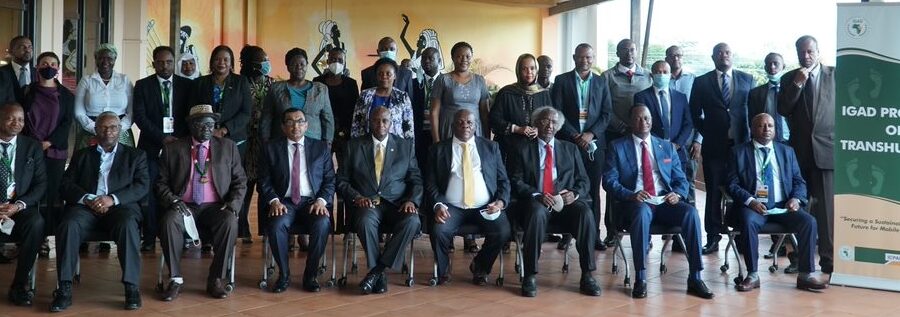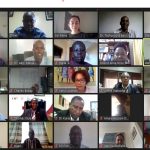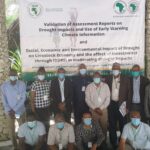Background
The need for the transhumance protocol in the IGAD region is premised on the understanding that mobility in search of water and pasture is paramount to the very survival of pastoralist communities. Transhumance is not just a ‘taker’, but contributes about 6-10% to the Countries’ GDP in the IGAD Region. The region lies within the Horn and Eastern Africa, which hosts the largest pastoralist groupings in Africa. Pastoral livestock supports about 70% of the pastoral livelihoods in the IGAD region and it is the only Africa’s region that is self-sufficient in terms of its supply for meat. The region normally exports about 12.8 million heads of sheep and goats as well as 60,000 tons of meat every year. Posing a challenge of continued extreme weather variation and conditions such as drought, climate change put pastoralists into persistent problems and conflicts in competition for pasture and water resources. As a result, transhumance pastoralists constitute an ecosystem that cannot be wished away in this region.
The SDG Agenda 2030 in which no human is left behind requires IGAD to take care for the pastoralists, which are often marginalized. The IGAD Member States and the Secretariat have come up with various strategies to deal with the challenges posed by transhumance, including establishing ICPALD in 2012 to foster development of the livestock sector; signing of MOUs between countries on cross border animal health; mapping of cross-order stock routes to establish transhumance corridors; and integrated early warning system on climate change. The Protocol on Transhumance is a great stride towards a comprehensive response to enhance sustainable pastoral development in the IGAD region. The process of developing IGAD Protocol on Transhumance encompassed a series of technical consultations with Member States, harmonization of a technically all-inclusive draft protocol through regional technical meetings, national and high-level regional negotiation meetings with Member States’ legal experts and policy makers, and Khartoum endorsement meeting of the Protocol by the IGAD Committee of Ambassadors held on 27th February 2020. The meeting also resolved that the Implementation Roadmap be subjected to the process of technical review, validation and endorsement.
It is against this background that IGAD held a two-day High-Level Experts and Ministerial meeting in Entebbe, Republic of Uganda on 12-13 November 2020. The purpose of the meeting was to brief the line Ministers on the status of the Protocol and seek their endorsement for the protocol implementation roadmap, given that the overall implementation of this protocol shall be coordinated and monitored by Sectoral Ministers responsible for livestock and/or pastoral development in IGAD Member States. Ministers responsible for livestock and/or pastoral development and their designated representatives, Minister of State for Karamoja Affairs, Uganda, as well as High-Level Experts, from IGAD Member States attended the session. Present also were representatives from the UN-IOM Regional Office for the Horn and Eastern Africa and the European Union Delegation. A representative of the UN-FAO Regional Office attended the meeting virtually via Zoom. High-level experts from the Member States reviewed and validated the Roadmap on 12 November 2020 before the endorsement of the Ministers on 13 November 2020. The meeting was official opened by Host Country through Hon. Moses Kizige, the Minister of State for Karamoja Affairs, Office of the Prime Minister, Republic of Uganda.
Objectives of the Meeting
The principal objectives of the High Level Experts & Ministerial Meeting were to:
- Review and Validation of the Implementation Roadmap for the Transhumance Protocol by the High-Level Technical Experts
- Update the Sectoral Ministers on the status of the Transhumance Protocol
- Endorsement of the Validated Implementation Roadmap by the Sectoral Ministers
- Garner the Ministerial support towards the signing and adoption of the Transhumance Protocol by the IGAD Council of Ministers of Foreign Affairs
Outcome and Conclusion of the Meeting
The IGAD Technical Experts reviewed and validated the final copy of the Roadmap to Implement the Protocol on Transhumance during the High-Level Technical preparatory meeting held on 12 November 2020. The Roadmap cover five broad areas including Signing, Adoption & Domestication; Strengthening of Good Governance for the IGAD Cross-Border Transhumance Clusters; Mapping and Designation of Cross-Border Transhumance Corridors and Resources; Promoting Investment in Pastoral Areas and complementary livelihood resources; and Monitoring of Cross-Border Transhumance Mobility, Community Engagement along Regular pathways and Reporting.
Under the chairmanship of H.E. Hon. Adil Idris, the Minister of Agriculture and Natural Resources, Republic of Sudan (IGAD Chair), the Sectoral Ministers endorsed the Roadmap for the implementation of Transhumance Protocol through a signed Communique on 13 November 2020. The Sectoral Ministers also called upon the IGAD Council of Ministers of Foreign Affairs to consider the speedy adoption of the Protocol.
Closing
Hon. Lt. Col. (Rtd) Dr. Bright Rwamirama, the Minister of State for Animal Industry, Republic of Uganda, officially closed the Ministerial meeting, with a commitment call to support the implementation of the Protocol and investment in pastoral livelihoods.






